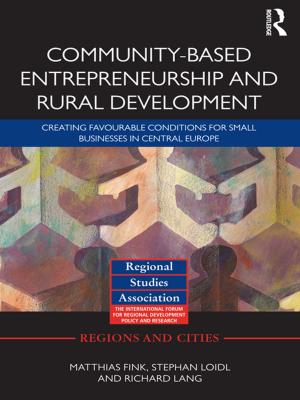Questioning Leadership
New directions for educational organisations
Nonfiction, Reference & Language, Education & Teaching| Author: | ISBN: | 9781317293705 | |
| Publisher: | Taylor and Francis | Publication: | November 10, 2016 |
| Imprint: | Routledge | Language: | English |
| Author: | |
| ISBN: | 9781317293705 |
| Publisher: | Taylor and Francis |
| Publication: | November 10, 2016 |
| Imprint: | Routledge |
| Language: | English |
Questioning Leadership offers a diverse mix of cutting-edge research in the field of educational leadership, with contributions from expert and emerging leadership scholars. It contextualises school leadership within broader social and historical contexts and traces its influence on school performance through time, from its relatively modest role within a systems theory paradigm to its growing influence from the 1980s onwards, as exercising leadership came to be perceived as being largely responsible for improving educational outcomes.
This book invites the reader to challenge the current orthodoxy of leader-centrism and instead reflect more broadly on the various structural and institutional interrelationships that determine how a school functions successfully. It poses challenging questions, such as:
- Is leadership really necessary for high-quality school performance?
- Can schools function effectively without leadership?
- Is it possible to describe the work that principals do without using the word ‘leadership’?
- How do we challenge the assumption that leadership simply exists and that it is seen as the appropriate default explanation for school performance?
This book does not assume that leadership is the key to organisational performance, although it acknowledges the work that principals do. It goes against current orthodoxy and offers varied perspectives on how leadership might be repositioned vis-à-vis organisational and institutional structures. It also suggests some new directions for leading and learning and throws open a discussion on leadership that for too long has been captured by the assumption that the leader is the cause of organisational performance and learning outcomes in schools.
At a time when leadership’s dominance seems unshakeable, this is a bold book that should appeal to postgraduate students of educational leadership and management, those undertaking training in educational administration and current school leaders interested in exploring the value of leadership for educational organisations.
Questioning Leadership offers a diverse mix of cutting-edge research in the field of educational leadership, with contributions from expert and emerging leadership scholars. It contextualises school leadership within broader social and historical contexts and traces its influence on school performance through time, from its relatively modest role within a systems theory paradigm to its growing influence from the 1980s onwards, as exercising leadership came to be perceived as being largely responsible for improving educational outcomes.
This book invites the reader to challenge the current orthodoxy of leader-centrism and instead reflect more broadly on the various structural and institutional interrelationships that determine how a school functions successfully. It poses challenging questions, such as:
- Is leadership really necessary for high-quality school performance?
- Can schools function effectively without leadership?
- Is it possible to describe the work that principals do without using the word ‘leadership’?
- How do we challenge the assumption that leadership simply exists and that it is seen as the appropriate default explanation for school performance?
This book does not assume that leadership is the key to organisational performance, although it acknowledges the work that principals do. It goes against current orthodoxy and offers varied perspectives on how leadership might be repositioned vis-à-vis organisational and institutional structures. It also suggests some new directions for leading and learning and throws open a discussion on leadership that for too long has been captured by the assumption that the leader is the cause of organisational performance and learning outcomes in schools.
At a time when leadership’s dominance seems unshakeable, this is a bold book that should appeal to postgraduate students of educational leadership and management, those undertaking training in educational administration and current school leaders interested in exploring the value of leadership for educational organisations.















